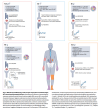tralfamadorian97
Established Member
Title: Antigen-driven T cell responses in rheumatic diseases: insights from T cell receptor repertoire studies
Journal: Nature Reviews Rheumatology
Authors: Jose Garrido-Mesa & Matthew A. Brown
Affiliation: Department of Medical and Molecular Genetics, Faculty of Life Sciences and Medicine, King’s College London, London, UK
Link: https://www.nature.com/articles/s41584-025-01218-9
Abstract:
Advances in T cell receptor (TCR) profiling techniques have substantially improved our ability to investigate T cell responses to antigens that are presented on HLA class I and class II molecules and associations between autoimmune T cells and rheumatic diseases. Early-stage studies in axial spondyloarthritis (axSpA) identified disease-associated T cell clonotypes, benefiting from the relative genetic homogeneity of the disease. However, both the genetic and the T cell immunological landscape are more complex in other rheumatic diseases. The diversity or redundancy in the TCR repertoire, epitope spreading over disease duration, genetic heterogeneity of HLA genes or other loci, and the diversity of epitopes contributing to disease pathogenesis and persistent inflammation are all likely to contribute to this complexity. TCR profiling holds promise for identifying key antigenic drivers and phenotypic T cell states that sustain autoimmunity in rheumatic diseases. Here, we review key findings from TCR repertoire studies in axSpA and other chronic inflammatory rheumatic diseases including psoriatic arthritis, rheumatoid arthritis, systemic lupus erythematosus and Sjögren syndrome. We explore how TCR profiling technologies, if applied to better controlled studies focused on early disease stages and genetically homogeneous subsets, can facilitate disease monitoring and the development of therapeutics targeting autoimmune T cells, their cognate antigens, or their underlying biology.
Journal: Nature Reviews Rheumatology
Authors: Jose Garrido-Mesa & Matthew A. Brown
Affiliation: Department of Medical and Molecular Genetics, Faculty of Life Sciences and Medicine, King’s College London, London, UK
Link: https://www.nature.com/articles/s41584-025-01218-9
Abstract:
Advances in T cell receptor (TCR) profiling techniques have substantially improved our ability to investigate T cell responses to antigens that are presented on HLA class I and class II molecules and associations between autoimmune T cells and rheumatic diseases. Early-stage studies in axial spondyloarthritis (axSpA) identified disease-associated T cell clonotypes, benefiting from the relative genetic homogeneity of the disease. However, both the genetic and the T cell immunological landscape are more complex in other rheumatic diseases. The diversity or redundancy in the TCR repertoire, epitope spreading over disease duration, genetic heterogeneity of HLA genes or other loci, and the diversity of epitopes contributing to disease pathogenesis and persistent inflammation are all likely to contribute to this complexity. TCR profiling holds promise for identifying key antigenic drivers and phenotypic T cell states that sustain autoimmunity in rheumatic diseases. Here, we review key findings from TCR repertoire studies in axSpA and other chronic inflammatory rheumatic diseases including psoriatic arthritis, rheumatoid arthritis, systemic lupus erythematosus and Sjögren syndrome. We explore how TCR profiling technologies, if applied to better controlled studies focused on early disease stages and genetically homogeneous subsets, can facilitate disease monitoring and the development of therapeutics targeting autoimmune T cells, their cognate antigens, or their underlying biology.

